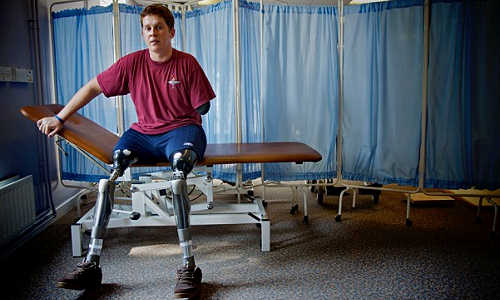A ‘leg bank’ — providing life-changing prostheses to low-income people who have lost limbs — is being developed by a team including University of Strathclyde researchers.
Academics from Strathclyde, and members of Dutch-based social enterprise organisation ProPortion, plan to establish a service in Colombia offering high-quality artificial legs to people who have lost limbs, often through injuries from landmines. The team aims to help people who struggle to find work, meaning they cannot afford to buy prosthetic limbs, or to support themselves and their families.
A team led by Dr Arjan Buis, from Strathclyde’s Department of Biomedical Engineering, has developed innovative technology, known as Majicast, to manufacture lower limb prosthetic sockets which fit prostheses securely to patients’ residual limbs.
ProPortion has devised a potential business model which would encompass training for people who are currently operating at prosthetic technician level, enhancing the quality of their product and enabling the service to become self-sustaining. If successful, the venture could be adapted for use in other countries.
While an agreement has been reached in Colombia for a nationwide programme of landmine removal, the devices have killed or injured more than 10,000 people in the past 25 years.
Dr Buis said: “Colombia has a high incidence rate for amputations, not only owing to landmines but also to other causes such as diabetes and traffic accidents. However, many people there are unable to get access to prostheses.
“The Majicast is a straightforward, fully automated, easy-to-use device that will produce high quality prosthetic sockets. The Majicast’s relative ease of use is particularly important in low-income countries, where human resources are often scarce and the demand is high.
“The device has been scientifically tested and clinically validated; this method has also been shown to be more repeatable and consistent than traditional methods.
“The Majicast is currently being optimised into a market-ready product, with the help of a design agency. We expect that this social enterprise venture can be successfully piloted in Colombia, then developed for other parts of the world.
“We have fantastic inventions but the capacity and organisational structure to bring them to markets is lacking; only then does an invention become an innovation. That’s why we have chosen to team up with ProPortion — their purpose is to serve people with low incomes in developing economies. That brings value to us; it helps our work to be relevant and impactful for society.”
Merel Rumping, Project Incubator with ProPortion, developed the idea for the leg bank after hearing of a surgeon in Thailand who, frustrated by a lack of access to quality prostheses, created his own from plastic bottle caps. She was also inspired by the many amputees without prostheses she saw during her time working with street children and former child soldiers in Colombia.
ProPortion produced the plan for a social enterprise following a feasibility study conducted with designers from Delft University of Technology.
Ms Rumping said: “We did research and found out Colombia has the highest landmine victim rate in the world. We also learned that many of them do not have access to high quality and affordable prostheses.
“It became clear that currently available prostheses are made from expensive imported components. We also understood that, in theory, the majority of Colombians have access to a prosthesis via healthcare insurance companies but that, in reality, these companies often delay payment.
“Therefore, some people do not get a prosthesis at all and if they manage to get approval, they have to travel for hours to the main cities, where the professional prosthesis workplaces are located. Many amputees from rural areas do not have the financial means to travel at all, and won’t get a prosthesis.
“Those who can pay for their travel expenses have to wait up to two or three months to have their prosthesis made; rehabilitation takes even longer. In this period they cannot work, and they cannot take care of their families.
“We want low-income amputees in Colombia to become socially included and financially self-sustainable by having easy access to high quality, affordable prosthesis. A potential business model is to use Majicast in combination with appropriate training aimed at clinically active people who currently perform at prosthetic technician level. We believe this will decentralise prosthetic care, meaning amputees don’t have to travel and also ensuring they are able to have their rehabilitation in their own communities.”
The partners in the leg bank project are currently seeking funding for the venture. They are in talks with potential investors and intend to begin a crowdfunding campaign in the near future.
Story Source:
The above story is based on materials provided by University of Strathclyde.





